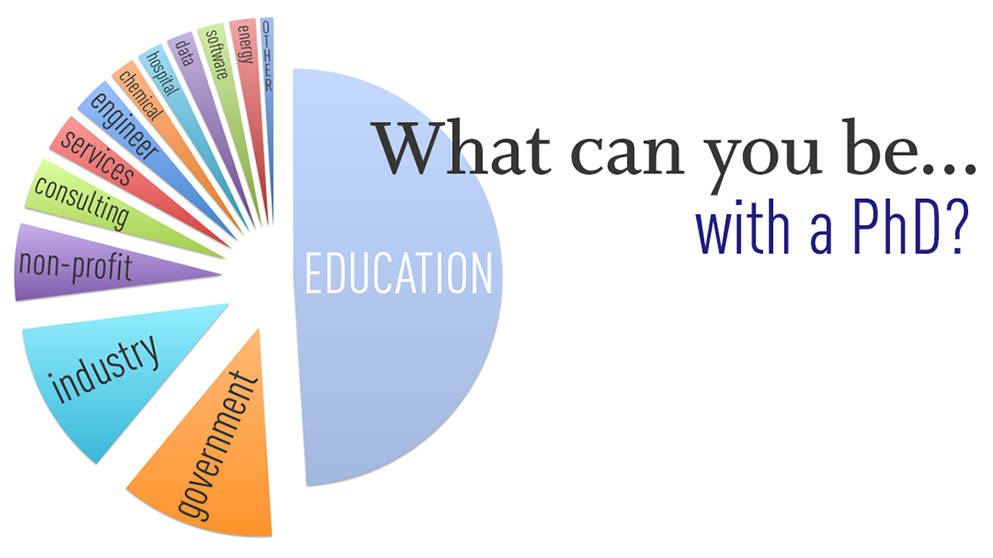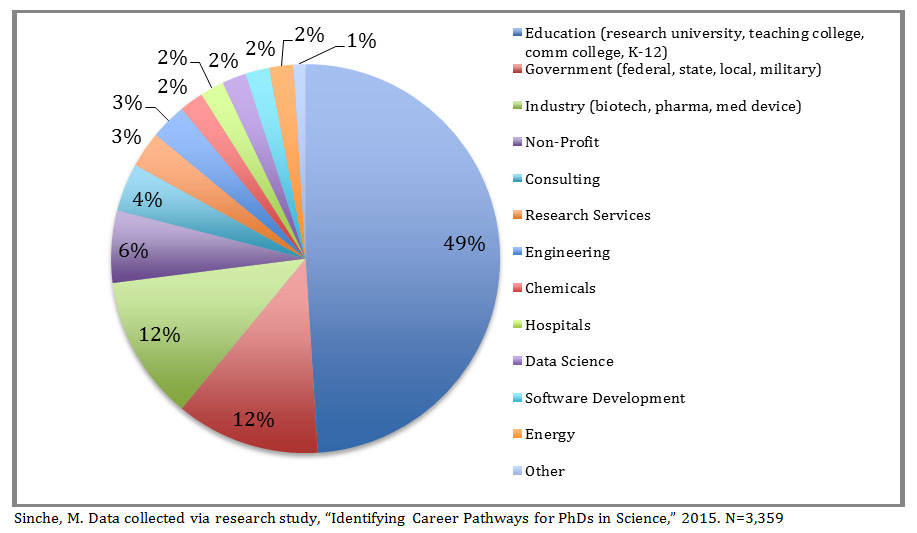
“I know what my PI does, but what other jobs are out there for PhDs in science?”
Graduate students and postdoctoral scholars engaged in scientific training are exposed to at least one occupation in the course of their training: that of the Principal Investigator, or PI. This group tends to develop a keen understanding of the ins and outs, the struggles and triumphs, and the pros and cons of this particular position by the very nature of their proximity to it. This exposure naturally leads to formation of opinions, positive or negative, of this career choice, and an analysis of fit for a particular person for this job.
If you have been down this road and carefully examined whether you would like to pursue the role of Principal Investigator, you may still be left wondering: What else is out there for me?
PhDs in science are employed in a wide range of occupations, including and outside of the professoriate. According to survey data collected in 2015 capturing employment data for PhD graduates from 2004 through 2014, 22% of a sample of 3,359 PhDs employed full-time are in tenure-track faculty positions. Where, then, are the remaining 78%?
If we begin with an examination of sectors, we can see where PhDs are employed — and this graph tells an interesting story.

Nearly half of the sample of PhDs who are employed full-time are engaged in work in the Education sector. If these PhDs are not in faculty jobs, what are they doing?
While we might imagine that a large percentage of PhDs hold non-tenure-track faculty positions, this group represents only 13% of the sample. The remainder are employed in a vast array of career options, including the following:
| Academic Advisor | Director, Core Facility | Biostatistician |
| Grants Administrator | Data Analyst | Laboratory Manager |
| Technology Transfer Specialist | Associate Dean | Research Scientist |
| Curriculum Developer | Clinical Trials Coordinator | Imaging Specialist |
| Public Affairs Officer | Department Chair | Clinical Psychologist |
| Collections Manager |
Do any of these occupations appeal to you? Are you curious about any of them? If you would like to learn more about any of the options listed here, it may be helpful to speak to a PhD employed in one of these professions. Often the best source of advice on any given career is a person employed in that career field. To find professionals in any of these areas, you might look to professional societies and associations. For instance, there is a national group focused on technology transfer called the Association of University Technology Managers, or AUTM. You might begin your research on their website to develop a stronger understanding of this career path, and then move to approaching one of their members to request an informational interview. These interviews provide you with a chance to build your knowledge about a particular career in a casual setting where you are not actually applying for a job, but are truly engaged in information gathering.
What about the other sectors? What types of jobs exist in federal, state, local, or military agencies? In this sector, the data reveals a greater percentage of PhDs pursuing basic research in fields of study related to their doctoral or postdoctoral training:
| Research Scientist | Field Application Specialist | Astrophysicist |
| Epidemiologist | Grants Administrator | Chemist |
| Watershed Ecologist | Staff Scientist | Biologist |
| Consultant | Policy Analyst | Program Officer |
| Director, Core Facility | Science Writer | Public Outreach Specialist |
| Data Analyst | Clinical Trials Manager | Quality Control Specialist |
| Neuroscientist |
In addition to basic research positions, there are also options in government agencies to write, to work on policy issues, to analyze data, to consider grant applications—the opportunities here for PhDs are broad. And as with any career you might be considering, what matters most are your own interests, skills, and personal values. What are you excited about? What are you good at? What is most important to you in a job?
In the industrial sector, which here comprises the biotechnology, pharmaceutical, and medical device and diagnostics sectors, the opportunities are likewise broad. You may be interested in drug development, clinical trials management, writing, scientific or medical illustration, marketing, new business development—think about what interests you most in this list and then reach out to professionals in the fields you’ve identified.
| Vice President, R&D | Regulatory Affairs Specialist | Product Development Scientist |
| Medical Writer | Data Scientist | Marketing Specialist |
| Computational Biologist | Medical Science Liaison | Team Leader |
| Technical Support Specialist | Laboratory Manager | Clinical Applications Manager |
| Business Development Analyst | Patent Attorney | Principal Investigator |
Finally, if we examine the non-profit sector, we find a broad array of environments in which to work: here you might find yourself at a non-profit research institute, like The Jackson Laboratory, conducting basic research in a search for cures to human disease, a scientific society that you have belonged to for years, developing educational programs for tomorrow’s trainees, an intergovernmental/nongovernmental organizations, such as the World Health Organization, examining patterns in data of diseases by geographic regions, or a science museum, where you might be building a new exhibit on climate change. Here are some other possibilities within this sector:
| Policy Analyst | Editor | Senior Scientist |
| Statistician | Project Manager | Science Writer |
| Engineer | Museum Educator | Executive Director of Education |
| Director, Postdoctoral Affairs | Program Officer |
All of the options listed above and throughout the article represent a small sample of the kinds of opportunities available for PhDs in science. Take time to investigate these and any other careers of interest. Follow up on suggestions from peers, mentors, and your PI. Research these options before applying to ensure that they will be a good fit for you, and chances are you will be more productive, stay in a career longer, and be happier in your job if you do.
Melanie Sinche is an educator, writer, and career counselor with more than 15 years experience working with and advising graduate students and postdoctoral scholars in university, non-profit, and government agency settings. Her work at the Jackson Laboratory for Genomic Medicine focuses on the career and professional development of all trainees through the development of novel educational programming. Follow Melanie on Twitter at @melaniesinche.